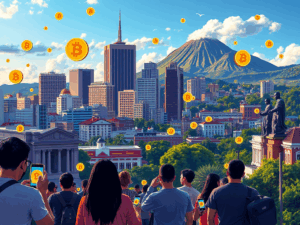Introduction
El Salvador became the first country to adopt Bitcoin as legal tender in 2021. This bold move aimed to reduce remittance costs, boost financial inclusion, and attract foreign investment. While the initiative sparked global debate, its outcomes offer valuable insights for other nations exploring crypto adoption. This guide breaks down El Salvador’s Bitcoin journey, its infrastructure, economic impact, and lessons learned.
Summary: El Salvador’s Bitcoin adoption aimed to solve remittance inefficiencies and financial exclusion. Despite technical challenges and volatility, the country gained global attention and continues to refine its crypto strategy.
Why Did El Salvador Adopt Bitcoin?
What problems was Bitcoin meant to solve?
President Nayib Bukele’s administration introduced Bitcoin to address three core issues:
- Financial exclusion: Over 70% of Salvadorans lacked access to banking services.
- Remittance fees: Remittances made up nearly 20% of GDP, with fees reaching 10%.
- Investment attraction: The government hoped to position El Salvador as a crypto innovation hub.
The launch of the Chivo Wallet, offering $30 in Bitcoin to each citizen, was designed to accelerate adoption. Over 4 million downloads were reported, though active usage remained low.
How Did Infrastructure Support Adoption?
What tools and systems were deployed?
El Salvador rolled out several infrastructure components:
- Chivo Wallet: Enabled Bitcoin transactions and instant USD conversion.
- Bitcoin ATMs: Over 200 installed nationwide for cash withdrawals.
- Merchant integration: Large brands like McDonald’s and Star
- bucks accepted Bitcoin, but only 20% of businesses followed suit.
- Bitcoin Beach: A grassroots pilot in El Zonte saw 90% of families using Bitcoin for daily needs.
Despite these efforts, technical glitches and limited internet access in rural areas hindered adoption. Many users cashed out their $30 bonus immediately, citing volatility concerns.

What Was the Economic Impact?
Did Bitcoin improve El Salvador’s economy?
El Salvador’s Bitcoin holdings fluctuated with market prices. As of late 2024:
| Metric | Value |
|---|---|
| Total BTC held | 5,865 coins |
| Average purchase price | $43,877 per BTC |
| Portfolio value | ~$318 million |
| Unrealized profit | ~$61 million |
The country also saw a 30% increase in tourism, driven by crypto enthusiasts. However, only 1% of remittances were processed via Bitcoin, and poverty rates remained unchanged.
What Is Bitcoin City and Volcano Bonds?
Are these projects still active?
To expand its crypto strategy, El Salvador proposed:
- Bitcoin City: A tax-free zone powered by geothermal energy from volcanoes.
- Volcano Bonds: $1 billion in tokenized debt backed by Bitcoin.
While implementation has been delayed due to market volatility, the government remains committed. The Strategic Bitcoin Reserve Fund now holds over 6,100 BTC.
What Regulatory Changes Were Made?
How did El Salvador respond to global scrutiny?
International institutions like the IMF raised concerns about financial stability. In response:
- Bitcoin’s legal tender status was scaled back to voluntary use.
- A $1.4 billion IMF agreement required rollback of mandatory Bitcoin acceptance.
- The government launched regulatory sandboxes and passed the Law to Facilitate Financial Inclusion.
These measures aim to balance innovation with consumer protection and maintain access to global financial markets.
What Lessons Can Other Countries Learn?
Is El Salvador’s model replicable?
Key takeaways from El Salvador’s experience:
- Infrastructure matters: Wallets, ATMs, and merchant tools must be reliable.
- Education is essential: Digital literacy programs are critical for adoption.
- Trust beats mandates: Voluntary use fosters better engagement than legal compulsion.
- Regulation is complementary: Sound frameworks enhance crypto’s credibility.
- Bottom-up adoption works: Local pilots like Bitcoin Beach outperform national rollouts.
Countries considering similar paths must prioritize adaptive governance, inclusive strategies, and technological readiness.
FAQ: El Salvador’s Bitcoin Strategy
Is Bitcoin still legal tender in El Salvador? No, its status was changed to voluntary use in 2025 following IMF negotiations.
How many Salvadorans actively use Bitcoin? Only about 20% of Chivo Wallet users remain active, despite 4 million downloads.
What is Bitcoin Beach? A coastal town, El Zonte, where Bitcoin is widely used for daily transactions, serving as a successful pilot.
Did Bitcoin reduce remittance costs? Yes, but adoption remains low. Only 1% of remittances use crypto channels.
What are Volcano Bonds? Tokenized debt backed by Bitcoin, proposed to fund Bitcoin City. Implementation is pending.
Has tourism increased due to Bitcoin? Yes, crypto tourism rose by 30%, boosting local businesses.
What is the Strategic Bitcoin Reserve Fund? A national portfolio holding over 6,100 BTC, used to support El Salvador’s crypto strategy.
Is El Salvador still buying Bitcoin? Yes, the government continues accumulating BTC despite market fluctuations.
Key Takeaways
- El Salvador’s Bitcoin adoption was driven by remittance reform and financial inclusion.
- Technical issues and volatility slowed adoption, but tourism and investment increased.
- Regulatory adjustments and education programs are shaping a more sustainable crypto strategy.
- Bottom-up pilots like Bitcoin Beach offer more effective models than top-down mandates.
- The country remains committed to crypto innovation through Bitcoin City and strategic reserves.




